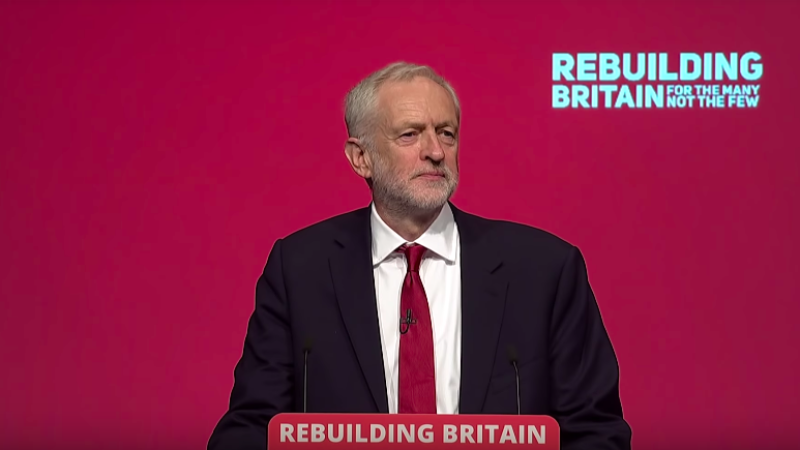
The date is not yet set but sometime this Autumn a weary nation will face a third election in under 30 months. It is an election that progressive forces will lose if they only appeal to people who voted remain in 2016. The Remain vote is divided while the Leave vote is falling in behind the Tories.
That’s why Labour must appeal to people on both sides of the Brexit divide, to stop a Boris Johnson victory. Labour supporters may find it hard to stomach, but they should back Jeremy Corbyn’s plan to offer a genuine choice between Remain and a negotiated Brexit deal.
Unlike the Conservatives or the most diehard Remain campaigners, Labour politicians genuinely want to reach out to people with a broad range of social backgrounds, cultural values and views on Brexit. But emotionally they find it hard to be the reasonable compromisers sat in the middle. Their personal politics are socially liberal and internationalist, and most of them would prefer to be fighting from the left on the economic battleground rather than acting as sensible centrists in the culture war.
But the party has been helped enormously by Johnson’s decision to frame Brexit as a ‘yes’ or ‘no’ choice on no deal. This has created the context in which moderate Leave and Remain voters can be united. Promising a referendum that gives a genuine choice between Remain or a deal can be presented as a least bad alternative to no deal, to all those who fear the cliff edge.
That means that when the election comes, Labour must not be just a party of Remain. Its vital role in the ‘rebel alliance’ will be to reach out to all those Brexit backers who are measured, indifferent or simply bored. The party must convince these soft Brexit voters that Johnson’s cliff edge is not an acceptable choice for anyone who cares about prosperity and peace.
Stopping Johnson winning his Brexit election will mean building all sorts of informal alliances and understandings so that anyone opposed to Tory extremists feels they have permission to vote for the local candidate best placed to stop them. But this strategy will only work if some of the people who voted Brexit are on board and this is the unique role that only Labour can play. In the election to come, Labour will appeal to Remainers in their millions. But the party must win the support of people who chose Brexit too. That way Labour can stop no deal, rebuild as a nationwide force and start to reunite the country.
Like in 2017, this is an election where almost nobody thinks the Labour party can win a majority. The ‘best case’ this year is that Labour will emerge as the largest party in a hung parliament. Even that will require a big improvement in the party’s recent fortunes.
The party has still not come to terms with this sobering reality, even though the challenges it faces are structural not cyclical. Its change in fortunes came with the post-2014 collapse of the party’s vote in Scotland, not Jeremy Corbyn’s rule. But four years after the disaster of the 2015 election, Labour continues to have the tribal psychology of a party that feels entitled to rule alone.
The party has been unable to adjust strategically or emotionally to see that cooperation with other political forces is not just necessary but normal. But nor has it been able to imagine a path back to its majoritarian past. In a divided Britain, Labour shows no prospect of assembling a coalition of voters sufficient to command a parliamentary majority. A major advance in Scotland is inconceivable at present, while making significant inroads in non-metropolitan England is unlikely while Brexit dominates debate.
The root causes of the party’s troubles are not really of its own making. Of course Labour has made mistakes along the way. But its position reflects the deeper reshaping and splintering of identities in every corner of Britain. In Scotland, nationalism is now the dominant political identity, while in England the toxic politics of Brexit has widened cultural and class divides.
The identities of both the main parties have changed profoundly too. The leadership and centre of gravity within Labour are further to the left than at any time in recent history, but the party has just about sustained its broad-church roots. For the Conservatives under Boris Johnson it is a different story, now that the leading voices of the One Nation tradition have been ejected without ceremony. The Tories, not Labour, are the party of splits and extremism.
And the Tories unlike Labour now seek the support of only one section of the electorate, with the Liberal Democrats mirroring them on the other side. Only Labour has a chance of reuniting our fractured country. It is the only party that is even trying to reach across divides.




More from LabourList
‘Labour’s quiet quest for democratic renewal’
‘Labour promised to make work pay. Now it must deliver for young people’
‘Council Tax shouldn’t punish those who have the least or those we owe the most’